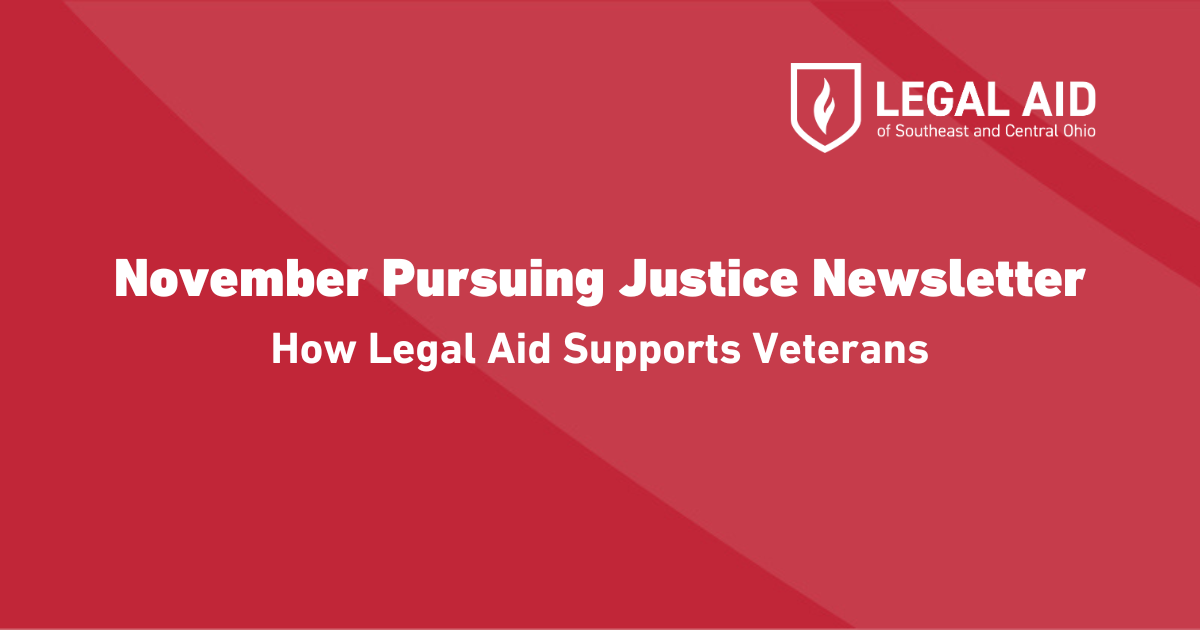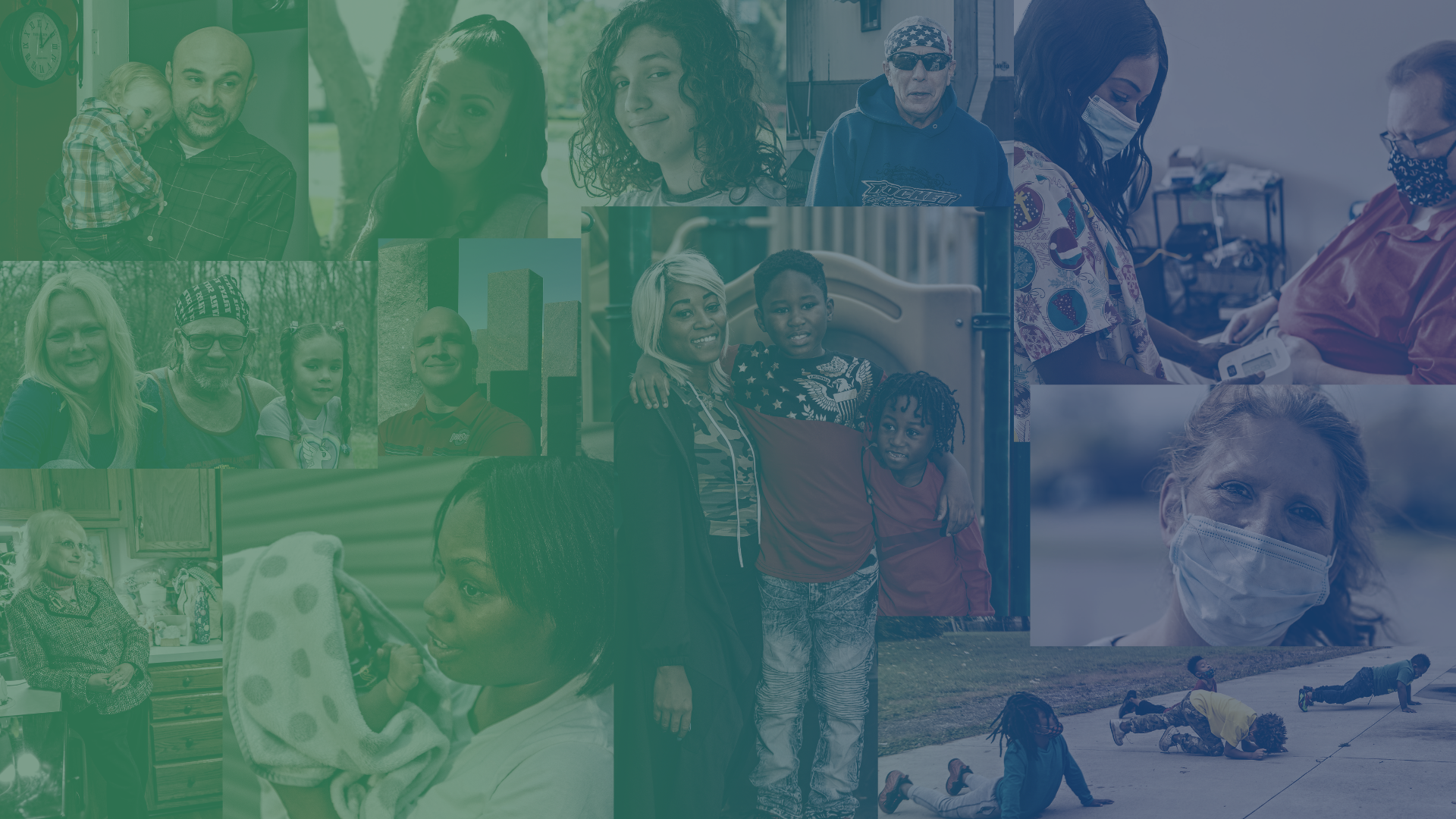January 2021 - Pro Bono Newsletter
In this issue: Volunteer Spotlight, CLE updates, Supreme Court ruling and fundraising.
Volunteer Spotlight: Patrick Barnacle
Attorney has served low-income clients in Tenant Advocacy Project during COVID-19 pandemic
Patrick Barnacle has not let COVID-19 deter his desire to give back to his community. As a regular volunteer at LASC’s Tenant Advocacy Project, he sees firsthand how devastating the pandemic has been on many low-income families. “A lot of people are hurting in our community,” he said. “When you work from home, it can be easy to be isolated from that pain, but if you step into the clinic, you can help relieve a little bit of it.”
Patrick is originally from Lower Allen Township, Pennsylvania, where he was raised by a single mother. He received his law degree from the University of Missouri. Patrick has since followed political aspirations that landed him in Columbus, where he has worked for the Ohio Democratic Party since 2016.
He attributes his commitment to pro bono work to his own upbringing and experiences with financial hardships. “I grew up with a single mother, and money issues were ever-present. My mother eventually lost her house while I was in law school, and it killed me that there was nothing I could do to help her,” he said. “I now assist with the TAP clinic, because it’s a small way for me to help people facing the loss of their home. Every time that I am able to resolve a case favorably, I feel like I’m getting pay-back for my mother.”
Patrick believes that making time to engage in pro-bono work has not only made him a better lawyer but also a better person. “It’s one thing to hear about an eviction crisis, and it’s quite another to be face-to-face with the people living it. Using my law license and my time to prevent homelessness while making myself a better and more well-rounded attorney in the process is a win-win,” he said.
In reflecting on his experiences during the pandemic, Patrick said that being able to serve at TAP has been the highlight of this past year. In a time where so much feels grim, the ability to aid in the achievement of positive outcomes for those facing eviction has meant a lot. “For more than one client, I was able to resolve the case simply by helping them fill out their applications for rental assistance and getting the landlord to agree to accept the aid. All I provided was my time, but the client told me, ‘Everything you give, you will receive tenfold.’ The genuine gratitude I’ve received has been a highlight of my life during the pandemic. I’ve witnessed real pain and experienced real joy,” he said.
Patrick also encourages others to get involved with TAP. While the area of law can feel uncomfortable at first, it’s easily learned, and the staff will help guide you through it, he said. When Patrick is not volunteering for LASC, he is usually spending time with his family and serving as a commissioner on the Greater Hilltop Area Commission. He thanks his spouse for being extremely supportive and allowing him to serve the community in the capacity that he does.
Thank you, Patrick!
CLE UPDATES
Guide for Attorneys Providing Virtual Advice
To ensure low-income people could still access legal help and advice during the COVID-19 crisis, LASC and SEOLS created a “Virtual Clinic” model, which engages volunteer lawyers in phone advice clinics. On Friday, Feb. 5 from noon to 1:30 p.m., we will host a live interactive webinar designed to support attorneys volunteering with these virtual clinics. The LASC and SEOLS Pro Bono Team will provide volunteer attorneys new to virtual clinics with an overview of the procedures. For pro bono attorneys who volunteered at virtual clinics in 2020, the team will provide updates, additional resources, and tips on how to maximize a virtual clinic consultation. (Application has been made for 1.5 hours of CLE credit.) Register here
On Wednesday, Feb. 17 from 1:30-4:30 p.m., OSLSA will host one final Bridging the Divide Clinic training. The CLE seeks to equip volunteer attorneys with the knowledge and skills to provide assistance to low-income clients dealing with child custody issues. (Application has been made for 2.5 hours of CLE credit.)
Board of Revision: Assisting Low-Income Homeowners with Property Value Complaints
LASC, in partnership with Columbus Realtors and the Franklin County Auditor's Office, will host a virtual CLE on Wednesday, Feb. 17 from 6-7:30 p.m. This webinar seeks to inform pro bono attorneys on how to best advise low-income home owners about the property value complaint process. The training will also cover the hearing process. (Application has been made for 1.5 hours of CLE credit.) Register Here
Volunteers Needed!
- for the Tax Court Calendar Call Clinic on Monday, Feb 1. Our virtual clinic will involve advising unrepresented taxpayers in the hopes that they can resolve their tax cases with IRS counsel. Client and IRS counsel contact will be via Zoom. If you are willing to help, please email Dianna Parker.
- to help with Unemployment Compensation Hearings. This program serves individuals with UC issues, including (1) guiding them through the application process (non-attorneys); (2) providing advice on eligibility or other procedural issues (attorneys); and (3) representing claimants in phone appeal hearings (attorneys).
- to offer Domestic Relations advice in our virtual clinics.
Ohio Supreme Court Rules in Favor of LASC Client
The Supreme Court of Ohio in December ruled in re Adoption of Y.E.F., Slip Opinion No. 2020-Ohio-6785, that indigent parents facing the loss of their parental rights in adoption proceedings in probate court are entitled to appointed counsel just like indigent parents facing the termination of their parental rights in juvenile court.
The decision is a “win” for both Ohio parents and children, said Ohio State Legal Services Association Executive Director Kate McGarvey. “As the Ohio Supreme Court noted in its decision, a right to appointed counsel for indigent parents facing the loss of parental rights ensures not only fairness for all parents in the adoption process, but also helps to ensure that Ohio courts have access to the information needed to make the best decisions for the children involved,” McGarvey said.
The case involves the family of twin boys who were born in 2014. When their father emptied the family’s bank account and fled the family home in April 2015 to avoid being arrested for a federal crime, their mother asked their father’s sister and her husband to temporarily care for the children. The aunt and uncle then sought custody of the twins. In April 2018, the aunt and uncle filed petitions to adopt them. Prior to the hearing, the mother filed a request for appointed counsel and included a letter from LASC raising the question of why indigent parents defending their rights are treated differently depending on whether the action occurs in a probate or juvenile court. The court denied the mother’s request and scheduled an adoption hearing.
During the hearing, the mother again asserted her desire for an attorney. When testimony in the case ran long, the judge continued it to a later date. Before the hearing could be restarted, the mother with the help of LASC and SEOLS, began a legal challenge claiming that indigent parents facing the loss of their parental rights in probate court should receive the same right to counsel that is provided to indigent parents in juvenile court.
The court agreed, saying: “We conclude that R.C. 2152.352 is unconstitutionally underinclusive as applied to indigent parents facing the loss of their parental rights in probate court. Instead of declaring the statute unconstitutional on its face, and significantly disrupting the multifarious juvenile-court proceedings in the state, we declare that indigent parents are entitled to counsel in adoption proceedings in probate court as a matter of equal protection under the law of the Fourteenth Amendment to the United States Constitution and Article 1, Section 2 of the Ohio Constitution.”
Use Your Birthday to Raise Money for Your Favorite Cause This Year
Are you trying to find ways to support your community during the pandemic? Did you know you can use your birthday to support your favorite cause? Consider supporting The Legal Aid Society of Columbus or Southeastern Ohio Legal Services in 2021 by organizing a Facebook Birthday Fundraiser.
According to Facebook, two weeks before their birthday, users will see a message from Facebook in their News Feeds giving the option to create a birthday fundraiser. Creator’s friends will then receive a notification inviting them to support the cause in honor of their friend’s special day.






